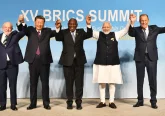On Friday, May 4 and Saturday, May 5, the University of Oxford Centre for International Studies (CIS) hosted an international interdisciplinary conference, jointly convened by the Academic Council on the United Nations System (ACUNS), and the Centre for Sustainable Development & International Peace at the University of Denver.
Featuring a variety of scholars and leaders in the field of peace and conflict studies, international development and theology, the conference aimed to “deepen the understanding of the paradoxical role of religion and spirituality in the contemporary social and political context, and its potential to shape global governance.”
The first panel, entitled “Religion, Civilization and Globalization”, began with a presentation by Katharine Marshall, Senior Fellow at the Berkley Centre for Religion, Peace and World Affairs at Georgetown University. Reflecting on her former role as Director of the World Bank in Mauritania, Professor Marshall spoke on the topic: “Bringing Mind, Heart and Soul into Globalization.” She emphasized the challenge for development practitioners and civil society to complement the undeniably central role played by faith-inspired organizations in the political, social and civic lives of communities in many parts of the world.

Stating that ‘secular’, ‘spiritual’, ‘religion’, and ‘faith’ are “all loaded terms”, Marshall contrasted the scepticism of the secular community towards faith-inspired groups with the doubts of religious organizations towards projects lacking a spiritual affiliation. While the former camp is wary of religion for its propensity to be divisive and proselytizing, an entirely negative characterization of the latter would ignore the important contributions of faith-inspired communities to peacebuilding, conflict resolution and social cohesion. Of course, NGOs and the civil sector have reason to be apprehensive, given the legacy of religious groups in perpetuating conservative views on gender roles, reproductive health, and women’s leadership; in many circles, religion is perceived as counter to the goals of development. On the other hand, Marshall remarked that the tendency towards overly technical approaches to humanitarian work by multilateral organizations is often seen as sterile and impersonal by aid recipients (the majority of whom come from traditional, religious backgrounds).
Regardless of one’s perspective, Marshall reminds us that worldwide membership to religious organizations dwarfs civil society in terms of numbers; given this reality, her efforts to bridge understanding between communities of faith and non-believers is particularly relevant to promoting human development. Similarly, the rest of the conference shed light on the critical, yet complex relationship between spirituality and statecraft in today’s increasingly global world.
For more information on the conference, including a list of speakers, visit the CIS website.
Cailin Crockett is a second-year MPhil in Political Theory at Oxford University, and a Graduate Ambassador for PoliticsinSpires.org







No Comment